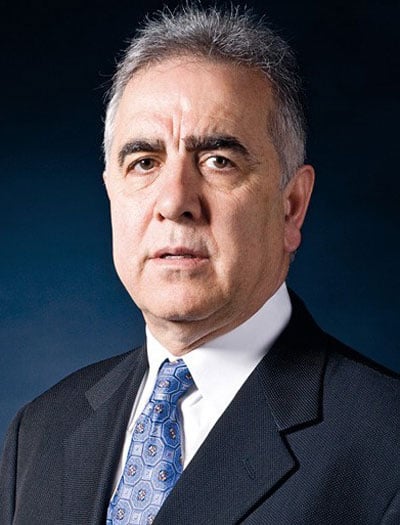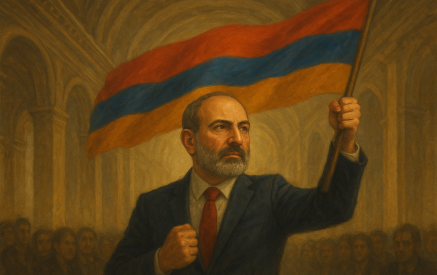By Harut Sassounian
Publisher, The California Courier
The Los Angeles Times published on January 11, 2022, an opinion column by Jonah Goldberg, titled: “Just meeting with Putin is a concession — the U.S. should be wary of giving more.”
Read also
Goldberg expressed his unhappiness that Russia and other members of its military coalition, the Collective Security Treaty Organization (CSTO), which includes Armenia, sent troops to Kazakhstan on a ‘peacekeeping’ mission earlier this month. In his article, Goldberg made a critical reference to Armenia: “None of CSTO’s members — Russia, Armenia, Belarus, Kazakhstan, Kyrgyzstan and Tajikistan — are democracies. Armenia comes closest; Freedom House designates it a ‘semi-consolidated authoritarian regime’ with a ‘Democracy Score’ of 33 out of 100. The rest are ‘consolidated authoritarian regimes.’”
Goldberg’s derogatory description of Armenia, which has been praised as a bastion of democracy since Prime Minister Nikol Pashinyan came to power in 2018, must have made Armenians feel uncomfortable.
Freedom House, a Washington-based research institute funded mostly by the U.S. government, regrettably proves that Goldberg was not wrong in his criticism of Armenia. Freedom House publishes an annual “Freedom in the World” report which assesses each country’s degree of democracy, including political freedom and civil liberties. Countries are classified as “free,” “partly free,” or “not free.”
When Pashinyan became Prime Minister, he was applauded by the international community and Armenians worldwide for establishing democratic rule through his “Velvet Revolution.” However, Freedom House continued to classify Armenia as “partly free” throughout 2018, 2019, 2020 and 2021. Armenia is also designated as “not an electoral democracy,” based on its low ratings on “political rights” and “civil liberties.” Just in case Azeris and Turks wish to celebrate Armenia’s low ratings, both Azerbaijan and Turkey are ranked far worse as “not free.”
Here are highlights from Freedom House’s detailed 30-page report on Armenia for the year 2020:
In the category of “National Democratic Governance,” with 1 as best and 7 as worst, Armenia was rated 2.25. This category “considers the democratic character of the governmental system; and the independence, effectiveness, and accountability of the legislative and executive branches.”
In the category of “Electoral Process,” Armenia was rated 3.25. It “examines national executive and legislative elections, the electoral framework, the functioning of multiparty systems, and popular participation in the political process.”
In the category of “Civil Society,” Armenia was rated 4.5. It “assesses the organizational capacity and financial sustainability of the civic sector; the legal and political environment in which it operates; the functioning of trade unions; interest group participation in the policy process; and the threat posed by antidemocratic extremist groups.”
In the category of “Independent Media,” Armenia was rated 3. It “examines the current state of press freedom, including libel laws, harassment of journalists, and editorial independence; the operation of a financially viable and independent private press; and the functioning of the public media.”
In the category of “Local Democratic Governance,” Armenia was rated 2.25. It “considers the decentralization of power; the responsibilities, election, and capacity of local governmental bodies; and the transparency and accountability of local authorities.”
In the category of “Judicial Framework and Independence,” Armenia was rated 2.5. It “assesses constitutional and human rights protections, judicial independence, the status of ethnic minority rights, guarantees of equality before the law, treatment of suspects and prisoners, and compliance with judicial decisions.”
In the category of “Corruption,” Armenia was rated 3. It “looks at public perceptions of corruption, the business interests of top policymakers, laws on financial disclosure and conflict of interest, and the efficacy of anticorruption initiatives.”
A second report on Armenia was published by Human Rights Watch (HRW) on January 14, 2022. HRW is an international non-governmental organization, headquartered in New York City that conducts research and advocacy on human rights.
HRW reported that even though “the political crisis” after the Artsakh war “was largely defused in the June 2021 snap elections … domestic violence, discrimination against people with disabilities, barriers to effective pain treatment and palliative care, and violence and discrimination based on sexual orientation and gender identity persisted. Striving to fight rising incidents of hate speech, authorities introduced regulations which may undermine freedom of speech.”
Regarding “accountability for law enforcement abuse and torture in custody,” HRW reported that “torture and ill-treatment in custody remains a problem and it is often perpetrated with impunity. Even when criminal investigations are launched in response to allegations of torture, they are rarely effective.”
In the first six months of 2021, there were “documented 15 cases, with 17 victims, of physical violence against journalists perpetrated by both public officials and private individuals.” There were also “heated public debates, which often included inflammatory speech by members of parliament and other public officials that was at times directed against human rights defenders and activists.”
The HRW also reported that “many children with disabilities remain segregated in orphanages, special schools, or at home with little or no education.” In May 2021, “parliament adopted the Law on the Rights of Persons with Disabilities, which includes guarantees of accessibility, independent living, and access to justice, and bans disability-based discrimination.”
According to HRW, “violence against women and children … remains a persistent problem.” In addition, “lesbian, gay, bisexual, and transgender (LGBT) people in Armenia continue to face harassment, discrimination, and violence.”
An indication that Armenia is losing its image of a democratic country is the fact that last March, U.S. Secretary of State Antony Blinken, in a call with Prime Minister Pashinyan, counseled him about “the importance of the rule of law and democratic institutions.”
Prime Minister Pashinyan came to power in 2018 promoting democracy, thereby gaining much support and praise from international circles. Regrettably, Pashinyan’s monopoly on power and increasing tendency to make all governmental decisions single-handedly are turning Armenia into a one-man rule which will result in the country losing its democratic credentials and international support.

























































